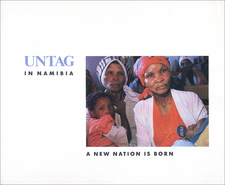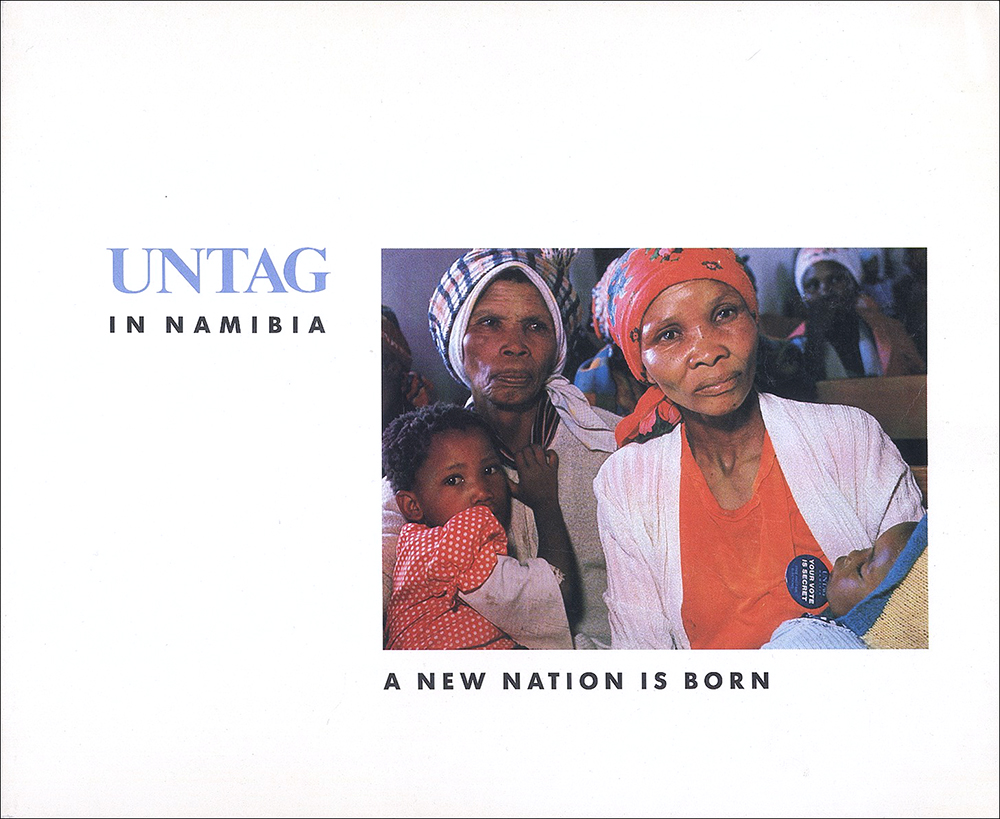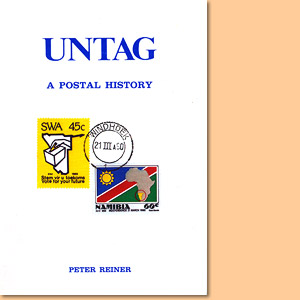UNTAG in Namibia: A New Nation is Born, by United Nations Transition Assistance Group in Namibia

UNTAG in Namibia: A New Nation is Born, by United Nations Transition Assistance Group in Namibia. UNITED NATIONS PUBLICATION SALES NO. E.90.1.10. Windhoek, Namibia 1990. ISBN 9211004349 / ISBN 92-1-100434-9
Produced by the United Nations Transition Assistance Group in Namibia in 1990, UNTAG in Namibia: A New Nation is Born, a photobook mit many interesting photographs, mirrors many aspects of their mission during the independance process of Namibia.
THE ROLE OF THE POLICE
UNTAG began with 500 police monitors, and ended up with 1,500. They came from 25 countries, and, at the end of the mandate, had 48 stations throughout Namibia. Their role was unique. They were there to monitor SWAPOL - the South West African Police - to ensure that they carried out their duties in a fair and impartial manner. During the 23 years of war, some of SWAPOL's sections had operated as a paramilitary organization, rather than as a regular police force. The counter-insurgency unit, koevoet ("crowbar") had been a part of SWAPOL. Police involvement in the war had caused mistrust and fear, especially in the north, where patrolling by convoys of armoured and mine-resistant vehicles - Casspirs, Buffalos and Wolves - filled with heavily - armed men, were seen as a constant form of intimidation. There had been many reports of abuse of authority and heavy-handed tactics, especially in regard to the police's encounters with SWAPO supporters. So the Settlement Plan sought to ensure that law and order would be enforced fairly, and not as a means of terrorising large sections of the population. [...]
THE ROLE OF THE MILITARY
United Nations' field operations have almost always in the past been peacekeeping, and primarily military. They have provided a highly visible, neutral international presence, and at times a physical buffer between hostile parties, while a political settlement was being pursued, usually separately. UNTAG's military tasks were not very different from those undertaken in traditional UN peacekeeping, but the component was unique in being integrated into a highly political operation, working on numerous fronts to achieve a rapid process of national reconciliation, free and fair elections, and internationally-recognized independence. The military component fulfilled the military aspects of the Settlement Proposal, as well as a massive logistical operation, responsible for communications, supply, air support, and engineering for the entire territory-wide UNTAG network. Under the command of Lt. Gen. Dewan Prem Chand (India), it was made up of 4475 soldiers from 21 countries, comprising three infantry battalions from Finland, Kenya and Malaysia: a military observers' group and eight specialist branches: engineers from Australia, a signal corps from the United Kingdom, airplane pilots from Spain and helicopter pilots from Italy, logistics units from Canada, Denmark and Poland, and a Medical Unit from Switzerland. [...]
THE POLITICAL CAMPAIGNS
The political campaigns did not formally begin until late September, after the official registration of ten political parties at the Supreme Court in Windhoek. But vigorous political activities had started months earlier. The two largest parties — SWAPO and the DTA — began with exuberant rallies in Windhoek's black township of Katutura in July, drawing crowds of many thousands. SWAPO's meeting was addressed by political leaders just returned under the amnesty and returnee programme after many years in exile. Soon, political rallies and meetings were taking place almost daily in towns and villages throughout the length and breadth of Namibia, festooned with posters, banners, colours. Suddenly, UNTAG's T-shirts, coveted and worn by (it sometimes seemed) half of Namibia, were rivalled by a hundred other designs, multi-coloured and partisan. UNTAG's Regional and District personnel attended nearly all the meetings, reporting back to the Special Representative each night. And UNTAG's police monitors, in their white UN vehicles, with the blue and white flag high above, were a constant, reassuring presence. [...]
This is an excerpt from UNTAG in Namibia: A New Nation is Born, by United Nations Transition Assistance Group in Namibia.
Title: UNTAG in Namibia
Subtitle: A New Nation is Born
Series: UNITED NATIONS PUBLICATION SALES NO. E.90.1.10
Publisher: United Nations Transition Assistance Group in Namibia
Windhoek, Namibia 1990
ISBN 9211004349 / ISBN 92-1-100434-9
Original softcover, 30 x 24 cm, 55 pages, throughout colour photos
United Nations Transition Assistance Group in Namibia im Namibiana-Buchangebot
UNTAG in Namibia: A New Nation is Born
'UNTAG in Namibia: A New Nation is Born' is an information script published by United Nations Transition Assistance Group in Namibia.
Weitere Buchempfehlungen
UNTAG. A postal history
This very interesting postal history guide gives insight on how the mail of the United Nations Transition Assistance Group UNTAG was handled.


